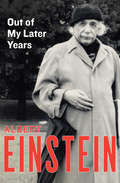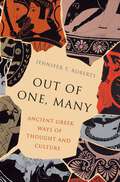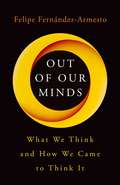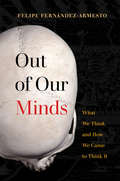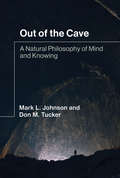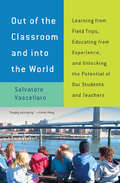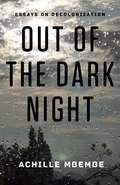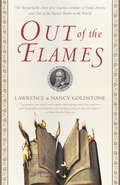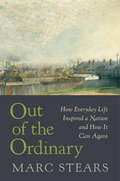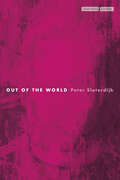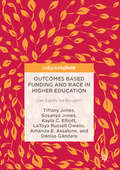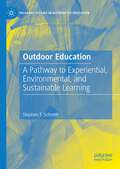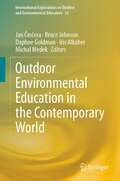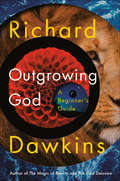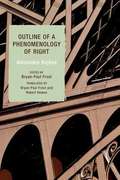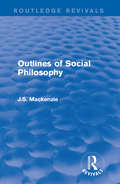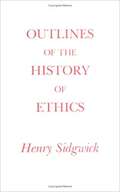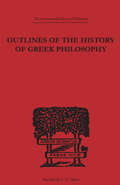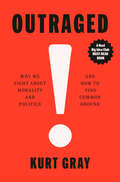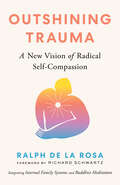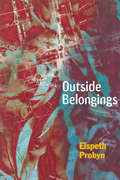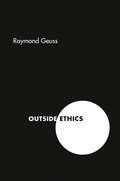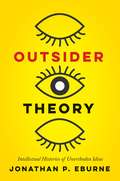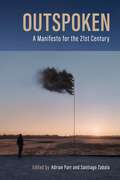- Table View
- List View
Out of My Later Years: The Scientist, Philosopher, and Man Portrayed Through His Own Words
by Albert EinsteinAn inspiring collection of essays, in which Albert Einstein addresses the topics that fascinated him as a scientist, philosopher, and humanitarian Divided by subject matter—&“Science,&” &“Convictions and Beliefs,&” &“Public Affairs,&” etc.—these essays consider everything from the need for a &“supranational&” governing body to control war in the atomic age to freedom in research and education to Jewish history and Zionism to explanations of the physics and scientific thought that brought Albert Einstein world recognition. Throughout, Einstein&’s clear, eloquent voice presents an idealist&’s vision and relays complex theories to the layperson. Einstein&’s essays share his philosophical beliefs, scientific reasoning, and hopes for a brighter future, and show how one of the greatest minds of all time fully engaged with the changing world around him. This authorized ebook features rare photos and never-before-seen documents from the Albert Einstein Archives at the Hebrew University of Jerusalem.
Out of One, Many: Ancient Greek Ways of Thought and Culture
by Jennifer T. RobertsA sweeping new account of ancient Greek culture and its remarkable diversityCovering the whole of the ancient Greek experience from its beginnings late in the third millennium BCE to the Roman conquest in 30 BCE, Out of One, Many is an accessible and lively introduction to the Greeks and their ways of living and thinking. In this fresh and witty exploration of the thought, culture, society, and history of the Greeks, Jennifer Roberts traces not only the common values that united them across the seas and the centuries, but also the enormous diversity in their ideas and beliefs.Examining the huge importance to the Greeks of religion, mythology, the Homeric epics, tragic and comic drama, philosophy, and the city-state, the book offers shifting perspectives on an extraordinary and astonishingly creative people. Century after century, in one medium after another, the Greeks addressed big questions, many of which are still very much with us, from whether gods exist and what happens after we die to what political system is best and how we can know what is real. Yet for all their virtues, Greek men set themselves apart from women and foreigners and profited from the unpaid labor of enslaved workers, and the book also looks at the mixed legacy of the ancient Greeks today.The result is a rich, wide-ranging, and compelling history of a fascinating and profoundly influential culture in all its complexity—and the myriad ways, good and bad, it continues to shape us today.
Out of Our Minds: What We Think and How We Came to Think It
by Felipe Fernández-Armesto&‘Immensely learned and ambitious…seam-bursting eclecticism and polymathic brio… This is by any standards a significant book and its author deserves high praise.&’ Literary ReviewTo imagine – to see that which is not there – is the startling ability that has fuelled human development and innovation through the centuries. As a species we stand alone in our remarkable capacity to refashion the world after the pictures in our minds. Traversing the realms of science, politics, religion, culture, philosophy and history, Felipe Fernández-Armesto reveals the thrilling and disquieting tales of our imaginative leaps. Through groundbreaking insights in cognitive science, he explores how and why we have ideas in the first place, providing a tantalising glimpse into who we are and what we might yet accomplish. Fernández-Armesto shows that bad ideas are often more influential than good ones; that the oldest recoverable thoughts include some of the best; that ideas of Western origin often issued from exchanges with the wider world; and that the pace of innovative thinking is under threat.
Out of Our Minds: What We Think and How We Came to Think It
by Felipe Fernández-ArmestoTo imagine—to see what is not there—is the startling ability that has fueled human development and innovation through the centuries. As a species we stand alone in our remarkable capacity to refashion the world after the picture in our minds. Traversing the realms of science, politics, religion, culture, philosophy, and history, Felipe Fernández-Armesto reveals the thrilling and disquieting tales of our imaginative leaps—from the first Homo sapiens to the present day. Through groundbreaking insights in cognitive science, Fernández-Armesto explores how and why we have ideas in the first place, providing a tantalizing glimpse into who we are and what we might yet accomplish. Unearthing and historical evidence, he begins by reconstructing the thoughts of our Paleolithic ancestors to reveal the subtlety and profundity of the thinking of early humans. A masterful paean to the human imagination from a wonderfully elegant thinker, Out of Our Minds shows that bad ideas are often more influential than good ones; that the oldest recoverable thoughts include some of the best; that ideas of Western origin often issued from exchanges with the wider world; and that the pace of innovative thinking is under threat.
Out of the Cave: A Natural Philosophy of Mind and Knowing
by Mark L. Johnson Don M. TuckerFrom a philosopher and a neuropsychologist, a radical rethinking of certain traditional views about human cognition and behavior.Plato's Allegory of the Cave trapped us in the illusion that mind is separate from body and from the natural and physical world. Knowledge had to be eternal and absolute. Recent scientific advances, however, show that our bodies shape mind, thought, and language in a deep and pervasive way. In Out of the Cave, Mark Johnson and Don Tucker--a philosopher and a neuropsychologist--propose a radical rethinking of certain traditional views about human cognition and behavior. They argue for a theory of knowing as embodied, embedded, enactive, and emotionally based. Knowing is an ongoing process--shaped by our deepest biological and cultural values. Johnson and Tucker describe a natural philosophy of mind that is emerging through the convergence of biology, psychology, computer science, and philosophy, and they explain recent research showing that all of our higher-level cognitive activities are rooted in our bodies through processes of perception, motive control of action, and feeling. This developing natural philosophy of mind offers a psychological, philosophical, and neuroscientific account that is at once scientifically valid and subjectively meaningful--allowing us to know both ourselves and the world.
Out of the Classroom and into the World
by Salvatore VascellaroBank Street College of Education professor Salvatore Vascellaro is a leading advocate of taking children and teachers into a wider world as the key to improving our struggling schools.Combining practical and theoretical guidance, Out of the Classroom and into the World visits a rich variety of classrooms transformed by innovative field trip curricula--showing how students' hearts and minds are opened as they discover how a suspension bridge works, what connects them to the people and places of their neighborhood, and as they come to understand the ecosystem of a river by following it to its source. Vascellaro shows, equally, that what teachers can offer children is fueled by their own engagement with the world, and he offers stunning examples of teachers awakened by their direct experiences with the social issues plaguing American society--from the flood-torn areas of New Orleans to the mining areas of West Virginia.Based on the core principles of progressive pedagogy, and the wisdom gained from Vascellaro's experience as a teacher, school administrator, and teacher educator, Out of the Classroom and into the World is a direct retort to test scores and standards as adequate measures of teaching and learning--an inspiring call and major new resource for anyone interested in reinvigorating America's classrooms.
Out of the Dark Night: Essays on Decolonization
by Achille MbembeAchille Mbembe is one of the world’s most profound critics of colonialism and its consequences, a major figure in the emergence of a new wave of French critical theory. His writings examine the complexities of decolonization for African subjectivities and the possibilities emerging in its wake. In Out of the Dark Night, he offers a rich analysis of the paradoxes of the postcolonial moment that points toward new liberatory models of community, humanity, and planetarity.In a nuanced consideration of the African experience, Mbembe makes sweeping interventions into debates about citizenship, identity, democracy, and modernity. He eruditely ranges across European and African thought to provide a powerful assessment of common ways of writing and thinking about the world. Mbembe criticizes the blinders of European intellectuals, analyzing France’s failure to heed postcolonial critiques of ongoing exclusions masked by pretenses of universalism. He develops a new reading of African modernity that further develops the notion of Afropolitanism, a novel way of being in the world that has arisen in decolonized Africa in the midst of both destruction and the birth of new societies. Out of the Dark Night reconstructs critical theory’s historical and philosophical framework for understanding colonial and postcolonial events and expands our sense of the futures made possible by decolonization.
Out of the Flames: The Remarkable Story of a Fearless Scholar, a Fatal Heresy, and One of the Rarest Books in the World
by Lawrence Goldstone Nancy GoldstoneOut of the Flames tracks the history of The Chrisitianismi Restituto, examining Michael Servetus's life and times and the politics of the first information during the sixteenth century. It is an extraordinary story providing testament to the power of ideas, the enduring legacy of books, and the triumph of individual courage.The Chrisitianismi Restituto, a heretical work of biblical scholarship, written in 1553, aimed to refute the orthodox Christianity that Michael Servetus' old colleague, John Calvin, supported. After the book spread through the ranks of Protestant hierarchy, Servetus was tried and agonizingly burned at the stake, the last known copy of the Restitutio chained to his leg. Servetus's execution marked a turning point in the quest for freedom of expression, due largely to the development of the printing press and the proliferation of books in Renaissance Europe. Three copies of the Restitutio managed to survive the burning, despite every effort on the part of his enemies to destroy them. As a result, the book became almost a surrogate for its author, going into hiding and relying on covert distribution until it could be read freely, centuries later. Lawrence and Nancy Goldstone follow the clandestine journey of the three copies through the subsequent centuries and explore its author's legacy and influence over the thinkers that shared his spirit and genius, such as Leibniz, Voltaire, Rousseau, Jefferson, Clarence Dorrow, and William Osler.
Out of the Flames: The Remarkable Story of a Fearless Scholar, a Fatal Heresy, and One of the Rarest Books in the World
by Lawrence Goldstone Nancy GoldstoneOut of the Flames tracks the history of The Chrisitianismi Restituto, examining Michael Servetus's life and times and the politics of the first information during the sixteenth century. It is an extraordinary story providing testament to the power of ideas, the enduring legacy of books, and the triumph of individual courage.The Chrisitianismi Restituto, a heretical work of biblical scholarship, written in 1553, aimed to refute the orthodox Christianity that Michael Servetus' old colleague, John Calvin, supported. After the book spread through the ranks of Protestant hierarchy, Servetus was tried and agonizingly burned at the stake, the last known copy of the Restitutio chained to his leg. Servetus's execution marked a turning point in the quest for freedom of expression, due largely to the development of the printing press and the proliferation of books in Renaissance Europe. Three copies of the Restitutio managed to survive the burning, despite every effort on the part of his enemies to destroy them. As a result, the book became almost a surrogate for its author, going into hiding and relying on covert distribution until it could be read freely, centuries later. Lawrence and Nancy Goldstone follow the clandestine journey of the three copies through the subsequent centuries and explore its author's legacy and influence over the thinkers that shared his spirit and genius, such as Leibniz, Voltaire, Rousseau, Jefferson, Clarence Dorrow, and William Osler.
Out of the Ordinary: How Everyday Life Inspired A Nation And How It Can Again
by Marc StearsFrom a major British political thinker and activist, a passionate case that both the left and right have lost their faith in ordinary people and must learn to find it again.This is an age of polarization. It’s us vs. them. The battle lines are clear, and compromise is surrender.As Out of the Ordinary reminds us, we have been here before. From the 1920s to the 1950s, in a world transformed by revolution and war, extreme ideologies of left and right fueled utopian hopes and dystopian fears. In response, Marc Stears writes, a group of British writers, artists, photographers, and filmmakers showed a way out. These men and women, including J. B. Priestley, George Orwell, Barbara Jones, Dylan Thomas, Laurie Lee, and Bill Brandt, had no formal connection to one another. But they each worked to forge a politics that resisted the empty idealisms and totalizing abstractions of their time. Instead they were convinced that people going about their daily lives possess all the insight, virtue, and determination required to build a good society. In poems, novels, essays, films, paintings, and photographs, they gave witness to everyday people’s ability to overcome the supposedly insoluble contradictions between tradition and progress, patriotism and diversity, rights and duties, nationalism and internationalism, conservatism and radicalism. It was this humble vision that animated the great Festival of Britain in 1951 and put everyday citizens at the heart of a new vision of national regeneration.A leading political theorist and a veteran of British politics, Stears writes with unusual passion and clarity about the achievements of these apostles of the ordinary. They helped Britain through an age of crisis. Their ideas might do so again, in the United Kingdom and beyond.
Out of the World (Cultural Memory in the Present)
by Peter SloterdijkIn this essential early work, the preeminent European philosopher Peter Sloterdijk offers a cross-cultural and transdisciplinary meditation on humanity's tendency to refuse the world. Developing the first seeds of his anthropotechnics, Sloterdijk theorizes consciousness as a medium, tuned and retuned over the course of technological and social history. His subject here is the "world-alien" (Weltfremdheit) in man that was formerly institutionalized in religions, but is increasingly dealt with in modern times through practices of psychotherapy. Originally written in 1993, this almost clairvoyant work examines how humans seek escape from the world in cross-cultural and historical context, up to the mania and world-escapism of our cybernetic network culture. Chapters delve into artificial habitats and forms of intoxication, from early Christian desert monks to pharmaco-theology through psychedelics. In classic form, Sloterdijk recalibrates and reinvents concepts from the ancient Greeks to Heidegger to develop an astonishingly contemporary philosophical anthropology.
Outcomes Based Funding and Race in Higher Education
by Tiffany Jones Sosanya Jones Kayla C. Elliott Latoya Russell Owens Amanda E. Assalone Denisa GándaraThis book examines how Performance or Outcomes Based Funding (POBF) policies impact racial equity in higher education. Over the last decade, higher education has become entrenched in a movement that holds colleges and universities more accountable to its supporters. There are pressures to answer questions about student outcomes and performance, the value of education, the effectiveness of instructors, and the ability of existing leaders to manage efficiently and effectively. It is within this climate that states have adopted POBF policies. Through POBF, public colleges and universities receive state funding through formulas that no longer rely solely on student enrollment, but are instead based on student outcomes. This book provides an overview for policymakers of how racial equity has been addressed, the impact of these approaches, and recommendations for moving forward.
Outdoor Education: A Pathway to Experiential, Environmental, and Sustainable Learning (Palgrave Studies in Alternative Education)
by Stephen T. SchrothThis book explores the phenomenon of outdoor education, an approach that permits children from all backgrounds to explore environmental, sustainability, and other issues facing them and their communities. Organized around both the conceptual and the practical issues facing school leaders interested in outdoor education, the book provides a wealth of resources for those interested in implementing outdoor education in their schools or classrooms. Infinitely flexible, outdoor education provides a lens through which teachers may explore any content area with any age group of children. Providing readers with both the theoretical underpinnings that support place-based curriculum as well as practical ways to implement an outdoor education program, the book also provides seven case studies that examine the issues facing school leaders desiring to make such a change. Outdoor Education: A Pathway to Experiential, Environmental, and Sustainable Learning guides those interested in exploring outdoor education through the curricular, instructional, and policy considerations needed to accomplish this goal.
Outdoor Environmental Education in the Contemporary World (International Explorations in Outdoor and Environmental Education #12)
by Bruce Johnson Jan Činčera Daphne Goldman Iris Alkaher Michal MedekThis edited volume explores the role of outdoor environmental education in the contemporary society. It identifies some of the opportunities and challenges of this educational area, particularly in the growing digitalization of the contemporary society and the distancing between people and nature. Furthermore, it seeks to answer why outdoor environmental education is essential for developing students’ environmental citizenship competencies or developing their relationship with nature. The book also introduces the various approaches existing in the field, discusses their relevance, and highlights their unique features. The book finishes with an overview of the practice of outdoor environmental education in selected countries from North America, Europe, and Asia.
Outgrowing God: A Beginner's Guide
by Richard DawkinsShould we believe in God? In this brisk introduction to modern atheism, one of the world’s greatest science writers tells us why we shouldn’t.Richard Dawkins was fifteen when he stopped believing in God. Deeply impressed by the beauty and complexity of living things, he’d felt certain they must have had a designer. Learning about evolution changed his mind. Now one of the world’s best and bestselling science communicators, Dawkins has given readers, young and old, the same opportunity to rethink the big questions. In twelve fiercely funny, mind-expanding chapters, Dawkins explains how the natural world arose without a designer—the improbability and beauty of the “bottom-up programming” that engineers an embryo or a flock of starlings—and challenges head-on some of the most basic assumptions made by the world’s religions: Do you believe in God? Which one? Is the Bible a “Good Book”? Is adhering to a religion necessary, or even likely, to make people good to one another? Dissecting everything from Abraham’s abuse of Isaac to the construction of a snowflake, Outgrowing God is a concise, provocative guide to thinking for yourself.Advance praise for Outgrowing God“My son came home from his first day in the sixth grade with arms outstretched plaintively demanding to know: ‘Have you ever heard of Jesus?’ We burst out laughing. Maybe not our finest parenting moment, given that he was genuinely distraught. He felt that he had woken up one day to a world in which his peers were expressing beliefs he found frighteningly unreasonable. He began devouring books like The God Delusion, books that helped him formulate his own arguments and helped him stand his ground. Dawkins’s new book is special in the terrain of atheists’ pleas for humanism and rationalism precisely since it speaks to those most vulnerable to the coercive tactics of religion. As Dawkins himself says in the dedication, this book is for ‘all young people when they’re old enough to decide for themselves.’ It is also, I must add, for their parents.”—Janna Levin, author of Black Hole Blues “When someone is considering atheism I tell them to read the Bible first and then Dawkins. Outgrowing God—second only to the Bible!”—Penn Jillette, author of God, No!
Outline of a Phenomenology of Right
by Robert Howse Alexandre Kojève Bryan-Paul FrostAlexandre Koj_ve offers a systematic discussion of key themes such as right, justice, law, equality, and autonomy in which he presages our contemporary world of economic globalization and international law. Edited and translated (with Robert Howse) by Bryan-Paul Frost, this is the authoritative English language translation of a monumental work in political philosophy.
Outlines of Social Philosophy (Routledge Revivals)
by J.S. MackenzieSocial philosophy can be considered the study of what unifies mankind and the study of values and ideals and what their meaning and worth is to human existence. Originally published in 1918, Mackenzie’s study provides a basic outline of what he believes is the origin of social philosophy whilst placing a focus on social order; dividing his work into the foundations of social order, national order and world order. This title will be of interest to students of Philosophy, Sociology and Anthropology
Outlines of the History of Greek Philosophy (International Library of Philosophy)
by Eduard ZellerFirst published in 2000. Routledge is an imprint of Taylor & Francis, an informa company.
Outraged: Why We Fight About Morality and Politics and How to Find Common Ground
by Kurt GrayA groundbreaking new perspective on the moral mind that rewrites our understanding of where moral judgments come from, and how we can overcome the feelings of outrage that so often divide usIt&’s easy to assume that liberals and conservatives have radically different moral foundations. In Outraged, Kurt Gray showcases the latest science to demonstrate that we all have the same moral mind—that everyone&’s moral judgments stem from feeling threatened or vulnerable to harm.We all care about protecting ourselves and the vulnerable. Conflict arises, however, when we have different perceptions of harm. We get outraged when we disagree about who the &“real&” victim is, whether we&’re talking about political issues, fights with our in-laws, or arguments on the playground.In this fascinating and insightful tour of our moral minds, Gray tackles popular myths that prevent us from understanding ourselves and those around us. While it is commonly believed that our ancestors were apex predators, Gray argues that for the majority of our evolutionary history, humans were more hunted than hunter. This explains why our minds are hard-wired to perceive threats, and provides surprising insights on the scientific origins of our values and beliefs. Though we might think ourselves driven by objective reasoning, Gray unveils new research that finds our moral judgments are based on gut feelings rather than rational thought, and presents a compelling reminder that we are more alike than we might think.Drawing on groundbreaking research, Gray provides a captivating new explanation for our moral outrage, and unpacks how to best bridge divides. If you want to understand the morals of the &“other side,&” ask yourself a simple question—what harms do they see?
Outshining Trauma: A New Vision of Radical Self-Compassion Integrating Internal Family Systems and Buddhist Meditation
by Ralph De La RosaDiscover a path of post-traumatic growth, spiritual insight, and deep compassion for the most challenging parts of yourself.Ralph De La Rosa integrates Richard Schwartz&’s revolutionary Internal Family Systems (IFS) model with Buddhist meditation practice to offer a radically different healing paradigm.If you&’re among those who&’ve tried therapy and meditation but wonder why you still suffer repetitive patterns and emotions, Outshining Trauma is for you. De La Rosa places the innovative, evidence-based model of IFS in the context of Buddhist meditation to show that the process of healing trauma can lead you to your deepest spiritual nature. This book offers clear conceptual frameworks to understand trauma, post-traumatic growth, and the close relationship between healing trauma and spirituality. The many journal prompts, experiential practices, and guided meditations will teach you how to:See that your mind is made up of disparate &“parts&” that carry their own views and intentions which can become stuck in traumatic experiencesRecognize common types of inner parts in the IFS model, such as &“Managers,&” &“Firefighters,&” and &“Exiles&”Separate from a part inside of you that&’s holding grief, pain, or other difficult feelings and then elicit its concerns and wisdomUtilize meditation as a method for opening to transformative self-compassion and self-loveA survivor himself of depression, PTSD, and addiction, De La Rosa shares gripping, inspirational life stories to demonstrate the path of outshining trauma.
Outside Belongings
by Elspeth ProbynOutside Belongings argues against a psychological depth model of identity--one in which individuals possess an intrinsic quality that guarantees authentic belonging. Instead, Probyn proposes a model of identity that takes into account the desires of individuals, and groups of individuals, to belong. The main ideas she considers--"the outside", "the surface", and "belonging"--allow her to articulate, in concrete terms, her precise concerns about sexuality and nationality.
Outside Ethics
by Raymond GeussOutside Ethics brings together some of the most important and provocative works by one of the most creative philosophers writing today. Seeking to expand the scope of contemporary moral and political philosophy, Raymond Geuss here presents essays bound by a shared skepticism about a particular way of thinking about what is important in human life--a way of thinking that, in his view, is characteristic of contemporary Western societies and isolates three broad categories of things as important: subjective individual preferences, knowledge, and restrictions on actions that affect other people (restrictions often construed as ahistorical laws). He sets these categories in a wider context and explores various human phenomena--including poetry, art, religion, and certain kinds of history and social criticism--that do not fit easily into these categories. As its title suggests, this book seeks a place outside conventional ethics. Following a brief introduction, Geuss sets out his main concerns with a focus on ethics and politics. He then expands these themes by discussing freedom, virtue, the good life, and happiness. Next he examines Theodor Adorno's views on the relation between suffering and knowledge, the nature of religion, and the role of history in giving us critical distances from existing identities. From here he moves to aesthetic concerns. The volume closes by looking at what it is for a human life to have "gaps"--to be incomplete, radically unsatisfactory, or a failure.
Outsider Theory: Intellectual Histories of Unorthodox Ideas
by Jonathan EburneA vital and timely reminder that modern life owes as much to outlandish thinking as to dominant ideologies What do the Nag Hammadi library, Dan Brown&’s The Da Vinci Code, speculative feminist historiography, Marcus Garvey&’s finances, and maps drawn by asylum patients have in common? Jonathan P. Eburne explores this question as never before in Outsider Theory, a timely book about outlandish ideas. Eburne brings readers on an adventure in intellectual history that stresses the urgency of taking seriously—especially in an era of fake news—ideas that might otherwise be discarded or regarded as errant, unfashionable, or even unreasonable. Examining the role of such thinking in contemporary intellectual history, Eburne challenges the categorical demarcation of good ideas from flawed, wild, or bad ones, addressing the surprising extent to which speculative inquiry extends beyond the work of professional intellectuals to include that of nonprofessionals as well, whether amateurs, unfashionable observers, or the clinically insane. Considering the work of a variety of such figures—from popular occult writers and gnostics to so-called outsider artists and pseudoscientists—Eburne argues that an understanding of its circulation and recirculation is indispensable to the history of ideas. He devotes close attention to ideas and texts usually omitted from or marginalized within orthodox histories of literary modernism, critical theory, and continental philosophy, yet which have long garnered the critical attention of specialists in religion, science studies, critical race theory, and the history of the occult. In doing so he not only sheds new light on a fascinating body of creative thought but also proposes new approaches for situating contemporary humanities scholarship within the history of ideas. However important it might be to protect ourselves from &“bad&” ideas, Outsider Theory shows how crucial it is for us to know how and why such ideas have left their impression on modern-day thinking and continue to shape its evolution.
Outspoken: A Manifesto for the Twenty-First Century (Outspoken)
by Adrian Parr and Santiago ZabalaIn a world of increasing right-wing populism, global capitalism, and a climate emergency, leading thinkers come together to interrogate the meaning and practice of being outspoken. The violence, nativism, persecution, and social hostilities of the twenty-first century demand a call to order: philosophical and theoretical communities must commit their intellectual resources to confronting and articulating the structures, desires, and resentment driving the dismantling of democratic values. Action in the absence of understanding and political vision devoid of inclusive ideas are all the more vulnerable to taking a reactionary turn. Contributors to this volume challenge the return of fascism, dehumanization of immigrants, distrust of science, intolerance of fair and equitable economic models, and suspicion of inclusive political platforms. All, in their own way, tackle the burning question of how we might reimagine twenty-first-century life in the face of divisive forces. Outspoken includes essays by some of the world’s most radical thinkers – Rosi Braidotti, Henry A. Giroux, Amelia Jones, and Slavoj Žižek, among others – who together chart multiple progressive courses for political antagonism and social intervention.
